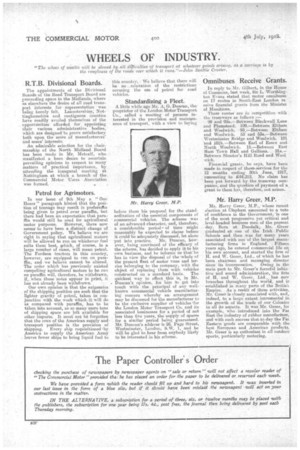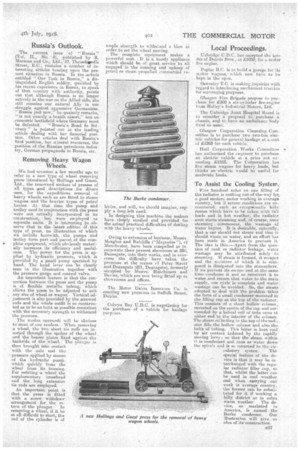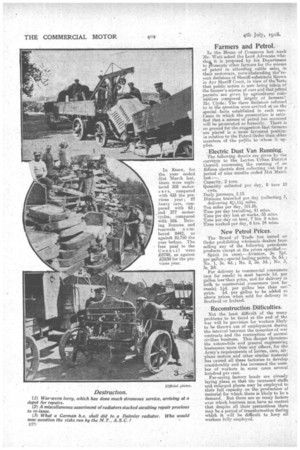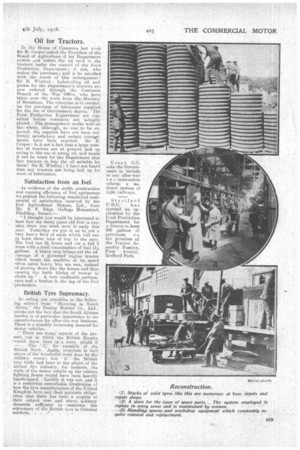WHEELS OF INDUSTRY.. .
Page 4

Page 5

Page 6

Page 7

If you've noticed an error in this article please click here to report it so we can fix it.
"The wheet of wealtn will be slowed by all diPculties of transport at whatever points arising, as a carriage is by . the roughness of the roads over which it runs."—John Beattie Crozier.
R.T.B. Divisional Boards.
The appointments of the Divisional Boards of the Road Transport Board are .proceeding apace in the Midlands, where as elsewhere the desire of all road transport interests for representation was being keenly felt. Leicestershire; Nottinghamshire and contiguous 'Counties have readily availed themselves of the . opportunities afforded for appointing ' their various administrative bodies, which are designed to prove satisfactory both upon the score of manufacturers' and users' interests
• An admirable selection for the chair.manShip of the North Midland Board has been made in Mr. Metcalf, who manifested a keen 'desire to ascertain prevailing opinions in respect to many matters of practical importance, by attending the inaugural meeting at Nottingham at which a branch of the Commercial Motor Users Association was formed.
Petrol for Agrimotors.
In our issue of 9th May a "One Hears" paragraph hinted that the position of tonnage may result in prefererke being given to petrol over paraffin, but there had been an expectation that paraffin would still be used for agricultural motor purposes. However, there pow seems' to have been a, distinct change of Government policy. We believe we are right in saying that agricultural motors will be allowed to run on whichever fuel suits them best, ,tv hich,. of course, in a large number of cases, will mean petrol.. The Fordson tractors in this country, however, are equipped to run on paraffin, and we believe cannot be altered. The order which has previously existed compelling agricultural motors to be run on paraffin will, therefore, be withdrawn, if, when these notes appear in print, it has not already been withdrawn.
Our own opinion is that the exigencies . of the shipping position are sueh that the lighter gravity of petrol, taken in conjunction with the work which .it will do as compared with paraffin, has to be taken into account, as so many more tons of shipping space are left available for other imports. It must not be forgotten that the crux of the American supply and transport position is the provision of shipping. Every ship requisitioned by America to supply the American Army , leaves fewer ships to bring liquid fuel to this country. We believe that there will be no relaxation of the restrictions covering the use of petrol for road vehicles.
Standardizing a Fleet.
A little while ago Mr. A. G.-Duncan, the proprietor of the London Motor Transport Go., called a meeting of persons interested in the provision and maintenance of transport, with a view to laying
before them his proposal for the standardization of the essential components of commercial vehicles. The scheme was of an advanced character, and, therefore, a considerable period— of time might reasonably be expected to elapse before it could be adequately discussed, let alone
put into practice. Mr. Duncan, however, being convinced of the efficacy of the scheme, has decided to apply ib to his own business, and be informs us that lie has in view the disposal of the 'Whole of the present fleet of motor vans and lorries belonging to the company, with the object of replacing them with vehicles constructed on a standard basis. The quickest way to effect this is, in Mr. , Duncan's ()pinion, for him to. get into touch with the principal of any wellknown commercial vehicle manufacturing concern whereby an arrangement may be discussed for the manufacturer to be the exclusive supplier of vehicles for the London Motor Transport Co. and its associated businesses for a period of not less than five years, the supply of Spares for a similar period being guaranteed. MO. Duncan's address is 26, Page Street, Westminster, London, S.W. 1, and he will be glad to hear from anybody likely to be interested in his scheme,
Omnibuses Receive Grants.
In reply to Mr. Gilbert, in the House of Commons, last week, Sir L. 'Worthington Evans stated that motor omnibuses on 17 routes in South-East London re ceive financial grants from the Ministei of Munitions.
These routes are in competitionwith the tramways as follows :— 99 and 99a.—Between Blackwell Lane and Plumsteed. 109.—Between Eltham and Woolwich. Pk—Between Eltfiam and Woolwich. 53 a,nd 53a.—Between Westminster Bridge and Woolwich. 101 and 101b.—Between Earl of Essex and North Woolwich. 15.—Between East Hain Town Hall and Gallions. 21a.— Between Shooter's Hill Road and Wool wich.
Financial grants, he says, have been made in respect of thestsservices for the 12 months ending 30th June, 1917, amounting to £44,312. No claim has been put forward by the tramway companies, and the question of payment of a grant to them has, therefore, not arisen.
Mr. Harry Greer, M.P. •
Mr, Harry Greer, M.P., whose recent election at Clapham amounted to a vote of confidence in the Government, is one of the most progressive yet critical and leveldmaded business men of the present day. Born at Dundalk, Mr. Greer graduated at) one of the Irish Public Schools and then was for many years associated with one of the largest manu-. factoring firms in England. . Fifteen years ago, he entered commercial life on his own account, and started the firm of H. and W. Greer, Ltd., of' which he has been chairman and managing director
since its incorporation. Owing in . the main part to Mr. Greer's forceful initiative and sound atbitinistration, the firm of H. . and W. Greer, Ltd.. has now branches throughout the world, and is established in many parts of the British Empire. • As •a result of these activities, Mr. Greer is closely associated with and, indeed, to a large extent intrurnerital in the growth of the trade of our Colonies in all its aspects. It was Mr. Greer, fee example, who introduced into the Far East the industry of rubber manufacture, and with such success that to-day the Far Eastern 'goods are comparable with, the best European and American prodUcts. Mr. Greer is an enthusiast in all outdoor sports, particularly motoring.
Russia's Outlook.
The current issue of " Russia " (Vol. II., No. 6), published by R. Martens and Co., Ltd., 67, Threachardle Street, E.C., contains a number of interestmg articles bearing upon the present situation in Russia. In the article entitled " Our Task in Russia," a distinguished English soldier, qualified by his recent experience in Russia, to speak of that country with anthority, points out that although Russia is no longer actively in the war on the Allied side, she still remains our natural Ally in our struggle against aggressive Germanism. " Russia just now,' he quaintly remarks, "is not. exactly a health resort," but an economic battlefield where Germany must be defeated. " Russia's Road to Sol' vency " is pointed out. in the leading article dealing with her financial position. Other articles deal with Russia's food position, her mineral resources, the position of the Russian petroleum industry, German propaganda in Russia, etc.
Removing Heavy Wagon Wheels.
We had occasion a few months ago to refer to a new type of wheel removing pressintroduced by Hollings and Guest, Ltd., the renowned makers of presses of all types stnd descriptions for divers uses, for the expeditions removal of heavy wheels such as are fitted to steam wagons and the heavier types of petrol lorries. At that time the pump and trolley used in conjunction with the press were not actually incorporated in its construction, but were employed as separate units. It is interesting to observe that in the latest edition Of this type of press, an illustration of which we include herewith, the pumps and trolley form part and parcel of the complete equipment; which obviously meter:ally increases its efficiency and useful
ness. The power for the press is applied by hydraulic pressure, which is provided by a email pump operated by hand. The hand lever can be clearly seen in the illustration together with the pressure gauge and control valve. --An important feature is that the connection between the press and the pump is of flexible metallic faibing, which allows the press to be adjusted to suit any size of wheel or wagon. Vertical adjustment is also provided by the screwed rods and the whole-outfit lt; so Constructed as to be as light as possible consistent with the necessary strength to withstand the pressure.
The modus operandi will be obvious to most of our readers. When removing a wheel, the two short tie rods are inserted through the spokes of the wheel . and the bearer plates fixed against the backside of the wheel. The plunge): is then brought into contact with the axle and the • pressure applied by .means of the hydraulic pump. which quickly frees the wheel from its housing. For refitting a wheel the supplementary crosshead and the long extension tie rods are employed.
• An important point is that the press is fitted with a screw withdraw
arrangement for the return of the plunger. In
removing a wheel, if it be at all difficult to start, the md of the cylinder is of ample strength to withstand a blow in order to set the wheel moving.
The complete equipment makes a powerful unit. It is a handy appliance which should be of great service. to all engaged in the running and upkeep of petrol or steare-propelled commercial ve
hides, and will, we should imagine, supPlya long-felt need.
In 'designing this machine the makers have closely Studied and provided for the actual( practical difficulties of dettling with the heavy wheels.
Owing to extension of business, Messrs. Meagher and Ratcliffe ('Magnetos ''), of Manchester, have been compelled to incorporate their present showroom at 280, Deansgate, into their works, and to overcome the difficulty have taken the premises at the corner cf Peter Street and Deansgate l2l, Deensgaite), formerly' occupied by Messrs. Hutchinson and Davies, which arenow being fitted up as
show rooms and offices.
The Motor Union Insurance Co. ii. erecting new premises in Suffolk Street, Dublin.
Colwyn Bay U.D.C. is negotiating for the purchase of a vehicle for haulage 'imposes.
Local Proceedings.
Uxbridge U.D.C. has aecepted the tender of Dennis Bros., at 21050, for a motor fire engine. • Poplar B.C. is to build a garage for its motor wagons, which now have to be kept in the open.
Oswestry T.C. is making inquiries with regard to introducing mechanical traction for sicavenging purposes.
Glas44)1V Fire Brigade propose to Imre chase for £300 a six-cylinder fire-engine from Halley's Indestrial-Motors, Ltd.
e The Uxbridge Joint Hospital Board is to consider a• proposal to purchase is chassis, and to have an ambulance body Heed to same.
Glasgow Corporation Cleansing Committee is to purchase two two-ton electric vehicles for general haulage at a cost of 1268 for each vehicle. • Hull Coeporation Works Committee has authorized the engineer to purchase -an electric vehicle at a price not exceeding £1165. The Corporation has five steam wagons fur heavy loads but thinks an-electric would be useful for moderate loads.
To Assist the Cooling System.
Five 'hundred miles on one filling of the radiator is nothing out-of-the-way fere a good modern motor working in average country, but if severe conditions are encountered, such as exceptionally 'hilly routes which have to be taken with full loads and in hot. weather, the radiator soon starts steaming and, of course, once steaming commences, the wastage of Water begins. It is desirable, naturally, that a car should not, steam and that is should waste no water, and an effort has been made in America to prevent it. The idea is thie:-Apart from the question of tank or radiator leakage, water wastage may be attributed solely to steaming. If steam is forined, it escapes and the moisture of which it is composed is dissipated into the atmosphere. If we prevent its escape and at the same time condense it and so reconvert it to water and return that water to the make supply, our cycle is complete and water wastage can be -avoided. So, the means adopted to deal with the problem takes the form of a small condenser mounted in the filling cap at the top of the radiator. This consists of t short hollow column, mounted on the centre of the cap and surrounded by a helical coil of tube open at either end to the' interior of the column. The steam coleeting in the top of the radiator fills the hollow column and also the helix of tubing. This latter is kept cool by air contact induced by the rapidly moving lorry; so that the steam within it is icondeneed and runs as wider down the spirals and is so returned to the circulatory systeMe The special feature of the device is that it may be interchanged with the regular radiator filler cap, so that, whilst the _latter can be used in cool weather and when eazrying out work in average country, the former -cab. be substituted for it if working a hilly district or in extra *arm weather. The device, . as marketed in America, is named the Burke condenser. Our illustration will give en idea of its'construction.
Farmers and Petrol.
In the House of Commons last week Mr. Watt asked the Lord Advocate whetheL it is proposed by his Department to gi,osecute other farmers for the misuse . of petrol in attending cattle sales., in their motorcars, notwithstanding the'recent decisions of Sheriff-substitute Brown in Ayr Sheriff Court, -in view of the4facts that public notice is now being taken of the farmer's misuse of cars and that petTol .permits are given by agricultural comniittees composed largely of farmers? Mr. Clyde ; The three decisions referred to in the question were arrived at on the special facts established in each case. Cases in which the prosecution is satisfied thaka misuse of petrol has occurred will be prosecuted as formerly. There is no ground for the suggestion that farmers are placed in a more favoured position in relation to the Petrol Order than other members of the public to whom it applies..
Electric Dust Van Running.
The following details are given by the surveyor to the Leyton Urban District Council concerning the running of an Edison electric dust. collecting , .van for a period of nine months endecl.31st Mairch
.last • Capacity, 2 tons. Quantity collected per day, 8 tons 10 ewts. • Daily journeys, 3.13.
Distance travelled per day. (collecting 7, delivering 4-1),11i miles.
Ton miles per clay, 101.86. Time per day travelling, 41 mins. Time per day lost at works, 33 mins. Time per day on beat, 7 lirs. 9 mills. Time worked per day, 8 hrs. 24 mins.
New Petrol Prices.
The Board of Trade has issued an Order prohibiting wholesale dealers from Selling any of the following petroleum products except at the prices specified :—
Spirit (in cans).—Aviation, 3s. 744. per gallon; special boiling' points, 3s. 5d. ; No. 1, 3s. 4d. ; No. 2, -3s. 3d. ; No. 3, 3s. 2d1 For delivery to commercial consumers (not for resale) in steel barrels Id. per gallon less than price, and for delivery in bulk to commercial consumers (not for resale) 1Acl. per gallon less than can"
price. H. per gallon to be added to above prices when sold for delivery in Scotland or Ireland.
Reconstruction Difficulties.
Not the least difficult of the many _ problems to be faced at the end of the war will be provision for workers likely to be thrown out of employment during the interval between the cessation of war • contracts and the resumption of normal civilian business. This danger threatens the automobile and general engineering businesses more than any others, for the Army's requirements of lorries, cars, airplane motors and other similar material has caused all these factories to develop considerably and has increased the number of workers in some cases several hundred per cent.
, Far-seeing factory heads are already laying plans so that the increased staffs arid enlarged plants may be employed to their full capacity on the production of material for which there is likely to be a demand, But there are so many factors over which business men have no control that despite all their precautions there may be a period of transformation during which it will be difficult to keep all workers fully employed.
Oil for Tractors.
In the House of Commons last week UM R.Cooper asked the President of the Board of Agriculture if his Department selects ...ad orders the oil used in the tractors under the control of the Food Production Depaitment ; if not, who makes the purchase ; and is he satisfiedi -with the result of this arrangement? Sir B. Winfrey : Lubricating oil and • grease for the Department's tractors an, now ordered through the Contracts Branch of the War Office, • who have . taken over the work from the Ministry of Munitions. The intention is to centralize the purchase of lubricants supplied' for the use Of Government depots. The Yood. Production Department are consulted befOre• Contracts arc actually,. placed. • • The arrangement works well on the. whole, although, as was , to be ex-. peeled, the supplies have not betel uni formly satisfactory and certain Consilsen inents. hair° been rejected. Sir B. Cooper : Is it not-a•fact that a large number el tractors are at present laid up owing to the use of wrong oil, and would it not be wiser for the Department that buy tractors to buy the oil suitable for them? Sir R. Winfrey:' I Im ve• not heard that any tractors are being laid up for want of lubricators.
Satisfaction from an Ivel.
A8 evidence of the stable construction .and running efficiency of Ivel agrimotors we publish the following unsolicited testimonial of satisfaction received by the Ivel 'Agricultural Motors, LLrL, from Mr. 8. F. Edge, Gallops Homestead, Ditehling,•'Sustex • " I thought you would he interested to hear how my many years.old'Ivel is run ning since you went over early thisyear. Yesterday we put it on to cut a Very heavy field of seeds which will run at least three tons of 'hay to the acre. The Ivel ran 8i hours and cut a full 9 acres with a total consumption of fuel 11* gallons. A heavy Crop beings out the ad-vantage of a' governed • engine tractor which keeps the Machine at its speed
• when extra heavy bits are met, instead of slowing down like the horses and 'thus • causing the knife• blades of mower to choke _up." A very creditable performance:and a feather in the cap of the Ivel production. , •
British Tyre Supremacy.
• In calling our attentiOn to the -follow
ing extract . from "Motoring .iii South Africa," • the • Dunlop' Rubber Co., Ltd. points out the fact that the South African market is of particular importance to Car manufacturers for after-the-war bbsiness. There is 0, steadily increasing demand for motor vehicles. • • • Bliere are mauy aspects of the present .1var in which the British Empire -would . have . been hi. a sorry plight if
The 'if,' for example . the British Navy. Again, everyone is wet aware of the wonderful work done by thi• military motor; but if ' 'the British tyre trade had been in the .plight of the aniline dye industry, for instance, the work of the motor, vehicle on the various fighting fronts would have .bcen: heavily . handicapped.. Luckily .it was not, 'and it is, a somewhat remarkable illustration cf • how _the tyre manufacturers of the United Kingdom have met .their:patricitic oblige-tMns that there has been a surplus of Mitinit over and 'aboveMilitary
• _• demands Sufficient to .•maintain • the supremacy Of the British tyre in Colonial markets. .• •• • ' •






















